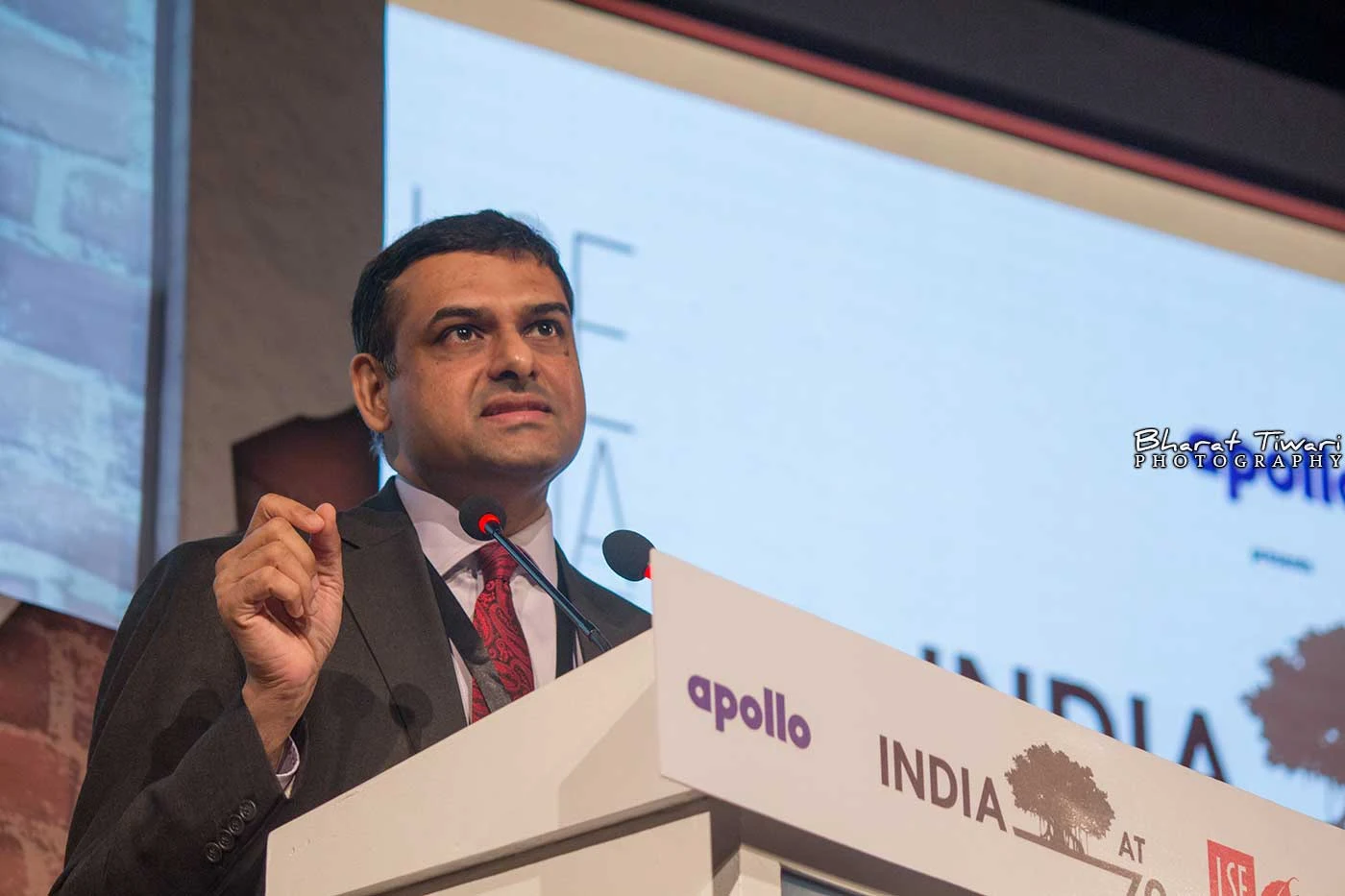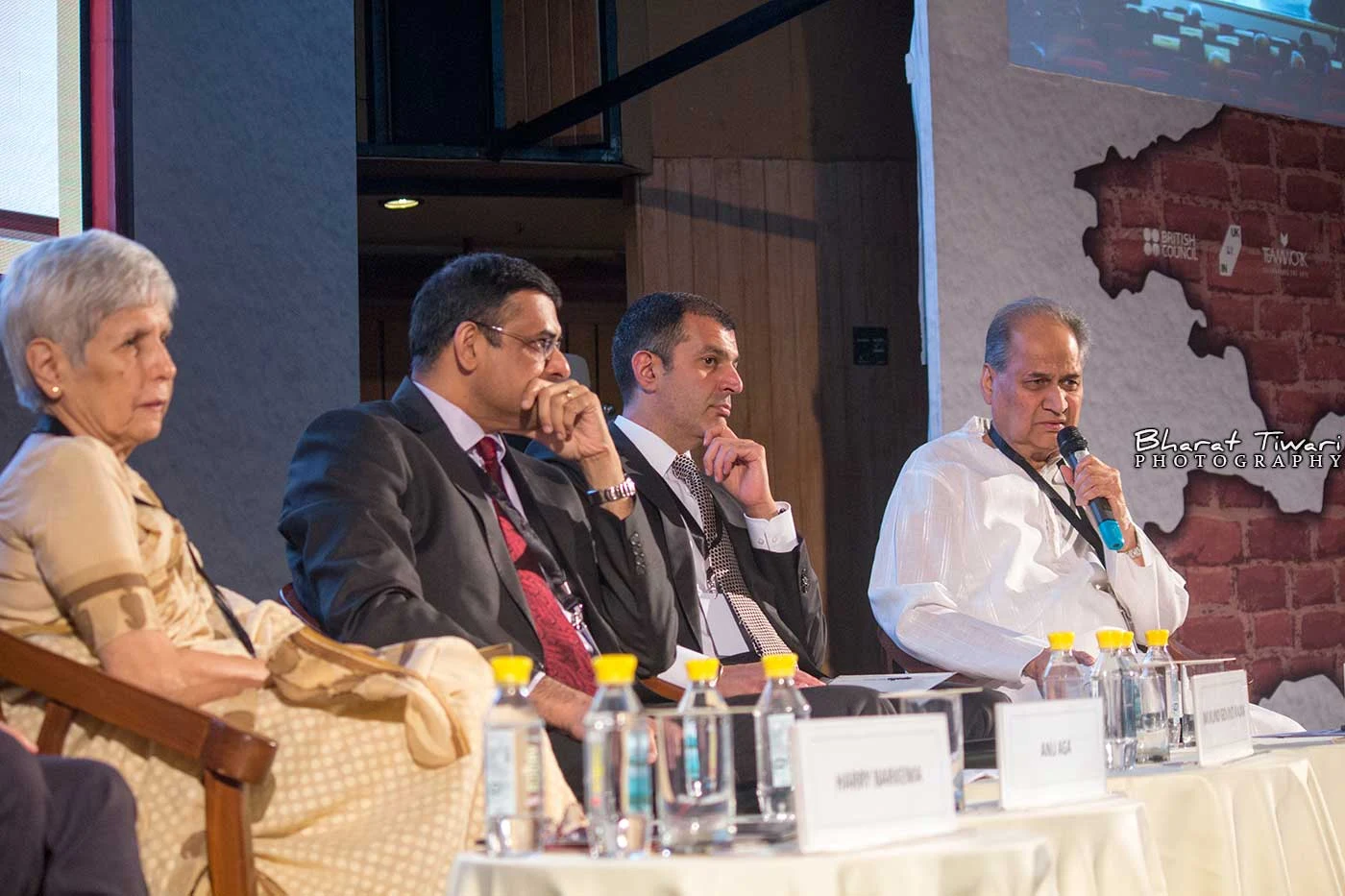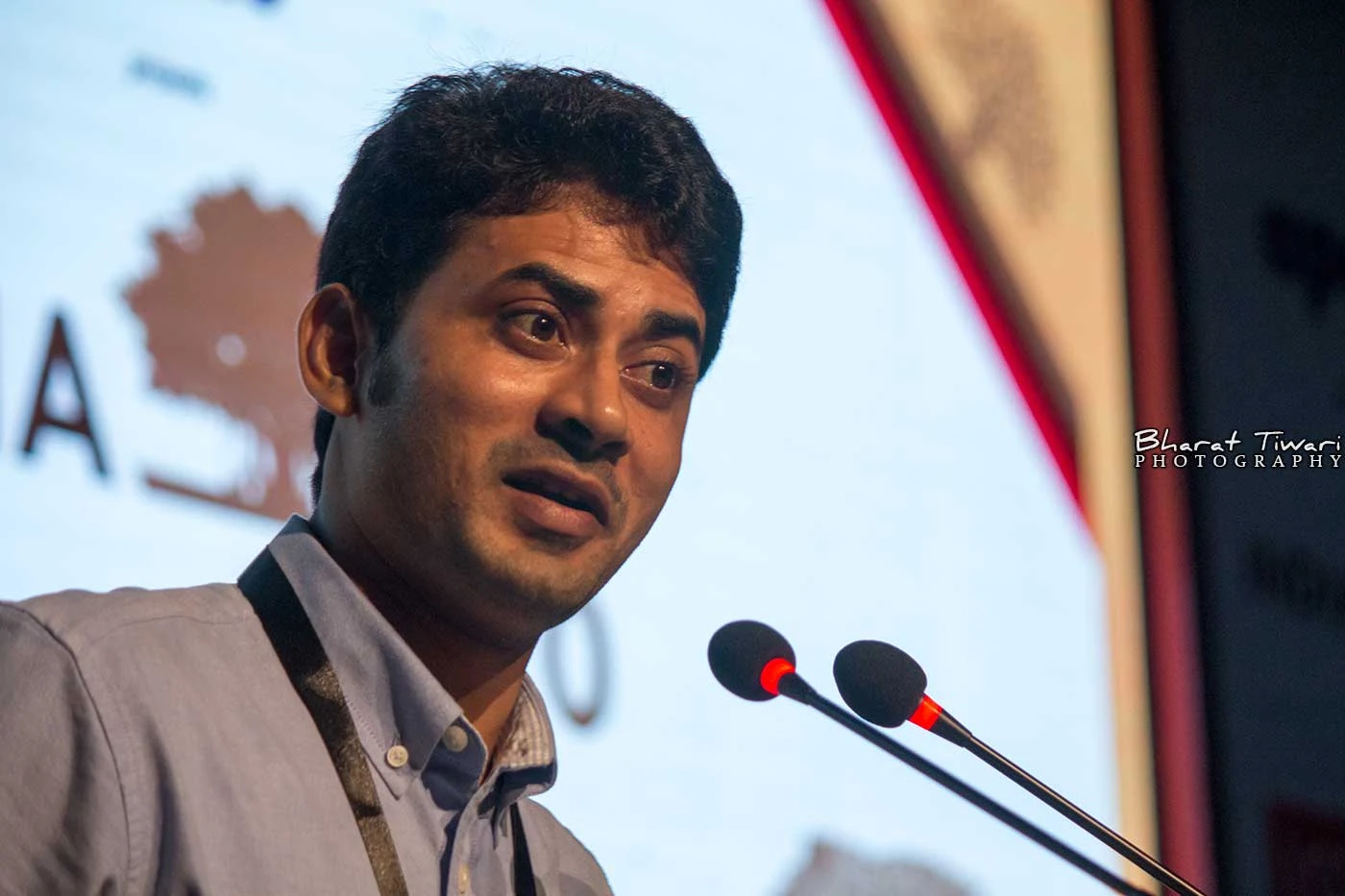Jamnalal Bajaj, had learned from Mahatma Gandhi.
— Rahul Bajaj
Before you go ahead and read this news, I'd like to tell you two incidents from the summit that moved me a) While mentioning Mahatma Gandhi in his speech, it was only Sir Dominic Asquith who said 'Gandhiji' b) Mr. Rahul Bajaj asking me—when we were having lunch—'Bring me some sweets but don't tell anyone.' Now you read this report which became possible because of the inputs from Saket Suman, Senior Correspondent at IANS. Hope you like the photographs.Bharat Tiwari

New Delhi, March 31, Britain's High Commissioner to India Sir Dominic Asquith on Wednesday said Britain and India share common interests and have to work together to "tackle" the threats.
He also said Britain supports Prime Minister Narendra Modi's ambition of smart cities, digital innovation and start-ups.
"We stand by what British Prime Minister Theresa May had said during her bilateral visit to India. We want to put the exchange of ideas, innovation and technology at the very heart of our relationship," Asquith said on the opening day of the LSE India Summit here.
"We support Prime Minister Modi's ambition of smart cities, digital innovation and start-ups. Both UK and India matter to each other. We have common interests and we have to tackle the threats of the future together," he said.
LSE India Summit is the annual summit of the South Asia Centre, London School of Economics and Political Science and it started here on Wednesday.
Titled "India at 70", the three-day event commemorates 70 years of India's independence and includes several discussions on core issues the country is facing in contemporary times.
The summit commenced with the inauguration of an exhibition from The Partition Museum, Amritsar, which showcases memories of one of the largest and most tragic displacements in history.
The exhibition offered a glimpse into the personal and public material available on the partition.
The audience were urged to share their stories, belongings and memories with the museum. This was followed by a dramatic reading of a letter written by a father to his son when they were separated during the partition by author Suhel Seth.

"The LSE-India Summit is a culmination of the strong ties between London School of Economics and India which have existed since the formation of the LSE," Mukulika Banerjee, Director of LSE South Asia Centre, said in her inaugural address.
"Marking 70 years of Indian Independence, we remember the difficult and great paths that the people of this nation have traversed in getting here and the exhibition of the Partition Museum is central to that," Banerjee said.



The first panel at ‘India @ 70: LSE India Summit 2017’ debated whether forced philanthropy or Corporate Social Responsibility (CSR) works in India. The session saw contrasting views over Clause 135 of the Companies Act 2013, which mandated companies that generate annual revenues above Rs 10 billion (approximately £120 million) to institute a minimum spend of 2% on CSR activities. Professor of Management at LSE and moderator of the discussion Harry Barkema, opened the session stating, ‘Smart CSR makes existing players more effective and makes it attractive for others to do real CSR.’

Chairperson of the ‘Teach for India’ campaign Anu Aga believed that ‘it is difficult to make compassion mandatory’ adding, ‘I’m not for compulsory CSR.’

Chief Ethics Officer for the Tata Group, Mukund Govind Rajan took a more optimistic view — with a note of caution regarding loopholes in the Act — ‘The fact that eligible companies now have to include an independent Director of the CSR committee means that CSR has entered the Boardroom.’


Vice-Chairman and Managing Director of Apollo Tyres Ltd., Neeraj Kanwar, believed the biggest learning from his experience of CSR was that ‘if you do good to your customer, good things happen to you in return.’

Chairman of the Bajaj Group, Rahul Bajaj described his experiences inheriting the trusteeship model that his grandfather, founder of the Bajaj Group, Jamnalal Bajaj, had learned from Mahatma Gandhi. Mr Bajaj articulated the importance of corporate ethics as essentially linked to CSR: ‘No amount of CSR expenditure justifies running a group unethically,’ he said, adding, ‘it is a tradition in India for the rich and strong to help the weak and poor.’


The session ‘Does India need Virtual Water?’, discussed India’s water security, its ecological footprint, and the domestic and international controversies around the issue of water-sharing.
Professor Amita Baviskar, of the Institute of Economic Growth, opened the session by reflecting on the looming crisis of water security: ‘Our economic growth has come at a great cost. We tend to be complacent about water thinking of it as a renewable resource.
Stockholm Water Prize awardee Professor J A (Tony) Allan, creator of the ‘virtual water’ concept, praised the cultural practice of vegetarianism in India.
Professor Marcus Moench, with his over four decades of experience in research on water related issues in India and South Asia criticised the usage of water for sanitation due to the pollution caused by it and the extra funds and energy expended in treating it, stressing on the need for switching to ‘zero-water’ sanitation solutions.
Dr Biksham Gujja said, ‘considering most experts had written India off at the time of its independence, India @ 70 has done phenomenally well.’
Environmentalist Manoj Misra revealed that 70% of India’s rivers are ‘either dead or dying.’ Until runaway industrialisation is put in check, especially for its impact on water quality, ‘India @ 70 is not unsafe’.


The day ended with a discussion between British academic and international relations scholar Michael Cox and historian Ramachandra Guha on the relationship LSE has had with India.


The discussions ranged from how the philosophies of early independent India were significantly influenced by the experience of the nation's founding fathers at the LSE to the modern day, when Indians constitute one of the largest body of foreign students at the university.
The inaugural ceremony also celebrated the strong personal stories of three students from the Salaam Baalak Trust wherein each person shared the journey which the Trust has enabled them to make: Mohammad Danish, who has since set up a social entrepreneurship company and is currently studying at the University of Bristol, Roma Singh who is still with SBT and sitting for her high school examinations this year, and Vijay Manjunath, who entered the Trust at the age of six, went on to train as an aeronautical engineer and after having worked several years in the corporate sector, co-founded a personalised photo-based gifting App last year.



LSE India Summit: India's foreign policy, constitution feature on Day 2
A wide range of issues that are crucial to contemporary India — its foreign policy, its relationships with its neighbours and the constitution — were elaborately discussed on the second day of the India at 70: LSE India Summit here on Thursday.The day witnessed engaging conversations around the emergence of India as a significant power in the global context as well as iterations on the evolving relevance and expectations of the Indian Constitution.
The first session titled "India Abroad: From Third World to Regional Power," saw a host of distinguished speakers including former Indian ambassador to the US Meera Shankar, former diplomat and Director-General of the Institute for Defence Studies and Analyses Jayant Prasad and journalist Jyoti Malhotra, among others.
On India's rise as a regional power, Jayant Prasad stressed the need for greater commitment to building regional strength through civic infrastructure projects undertaken by India in Afghanistan and its grid connectivity partnerships with Nepal and Bangladesh. Former Foreign Secretary Kanwal Sibal also reiterated this sentiment.
Meera Shankar, on the other hand, extolled India's efforts at balancing the goal of development with democratic rights while emphasising how India's rise would set a great example for the world.
Former Indian diplomat and expert on foreign affairs Rakesh Sood remarked that the geopolitical centre of gravity was shifting from the Euro-Atlantic to the Asia-Pacific.
"It's not just that India is changing. It is changing against a changing backdrop, which makes it more challenging," he said.
Senior Fellow at the Carnegie Endowment for International Peace Ashley J. Tellis felt that India's foreign policy since independence has been "remarkably successful".
The day also saw an engaging panel of legal experts exploring the history and future of the Indian constitution.
Speaking from her years of experience documenting and fighting injustice, Kalpana Kannabiran, author of "Tools of Justice: Non-Discrimination and the Indian Constitution" and Director of the Council for Social Development, Hyderabad expounded on the freedoms guaranteed by the constitution but not necessarily enjoyed by the people.

"Freedom of expression and the right to food covers beef," she said, explaining that banning beef is a violation of the constitutional freedoms of non-Brahmin Hindus. "What you eat is a part of a culture and is an intrinsic part of who you are," she added.
Additional Solicitor General Pinky Anand explained that "in spirit, the Indian constitution is native". A former Head of the BJP's All-India Legal Cell, Anand added that constitutionally enforced patriotism "emerges from a dark age of recent history and possibly would not be in cognisance with fundamental rights".

She also said that "it is high time we got away from the concept of rights and focused on the concept of duties".
Chintan Chandrachud, an Associate at the leading London law firm Quinn Emanuel Urquhart & Sullivan felt that ‘the constitution has changed, is changing, and will continue to change in time’, as evidenced by discussions about NOTA and the ban on caste-based campaigning in elections.

Madhav Khosla, the inaugural BR Ambedkar Academic Fellow at Columbia Law School said that we think we can legislate ourselves out of our problems, but we can’t,’ adding that ‘no constitution will create the conditions for it to work perfectly.’

In an extended question and answer session, the panel and the audience at the India Habitat Centre's Stein Auditorium discussed the nature of political dissent and enforced patriotism in the context of the recent events at Ramjas College, and the ruling on playing the national anthem before screening films at cinema theatres.
Moderating this discussion was Mukulika Banerjee, Associate Professor of Anthropology at LSE and founding Director of the LSE South Asia Centre.






(with input from Saket Suman, Senior Correspondent at IANS, Indo-Asian News Service)












0 टिप्पणियाँ